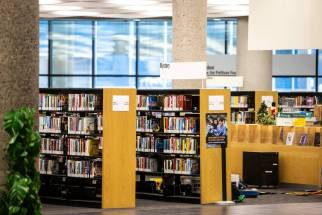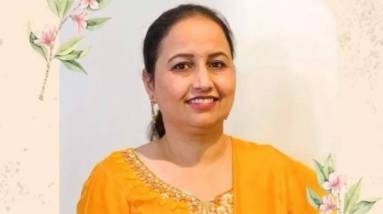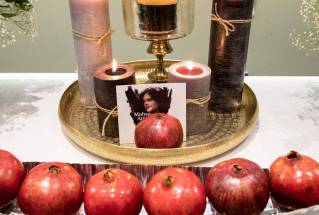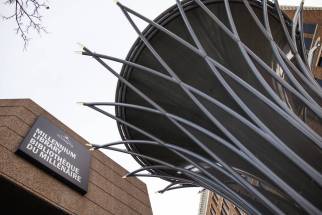‘Can’t let go of hope’ For local Iranian community, solstice festival focused more than ever on searching for a flicker of light in the darkness
Read this article for free:
or
Already have an account? Log in here »
To continue reading, please subscribe:
Monthly Digital Subscription
$0 for the first 4 weeks*
- Enjoy unlimited reading on winnipegfreepress.com
- Read the E-Edition, our digital replica newspaper
- Access News Break, our award-winning app
- Play interactive puzzles
*No charge for 4 weeks then price increases to the regular rate of $19.00 plus GST every four weeks. Offer available to new and qualified returning subscribers only. Cancel any time.
Monthly Digital Subscription
$4.75/week*
- Enjoy unlimited reading on winnipegfreepress.com
- Read the E-Edition, our digital replica newspaper
- Access News Break, our award-winning app
- Play interactive puzzles
*Billed as $19 plus GST every four weeks. Cancel any time.
To continue reading, please subscribe:
Add Free Press access to your Brandon Sun subscription for only an additional
$1 for the first 4 weeks*
*Your next subscription payment will increase by $1.00 and you will be charged $16.99 plus GST for four weeks. After four weeks, your payment will increase to $23.99 plus GST every four weeks.
Read unlimited articles for free today:
or
Already have an account? Log in here »
Hey there, time traveller!
This article was published 22/12/2022 (1081 days ago), so information in it may no longer be current.
It should have been a joyful night, Wednesday at Centro Caboto, but it wasn’t. The gathering’s first hours glided by in a pensive and restrained quiet. On the low stage, candles flickered, throwing gentle light on white flowers and rows of framed photos, each one bearing the face of a young life stolen on the streets of Iran.
Yalda Night isn’t usually like this, Arian Arianpour said. It’s supposed to be happy. It’s an ancient festival, celebrated in Iran for over 2,500 years: a night for music and dancing, poetry and stories, family and friends. A night for the winter solstice, to celebrate the moment that light will, once again, claim the day back from darkness. That day always comes.
JESSICA LEE / WINNIPEG FREE PRESS Anahita Aminian and her husband came to Winnipeg 36 years ago and were one of the first Iranian families to settle in the city. 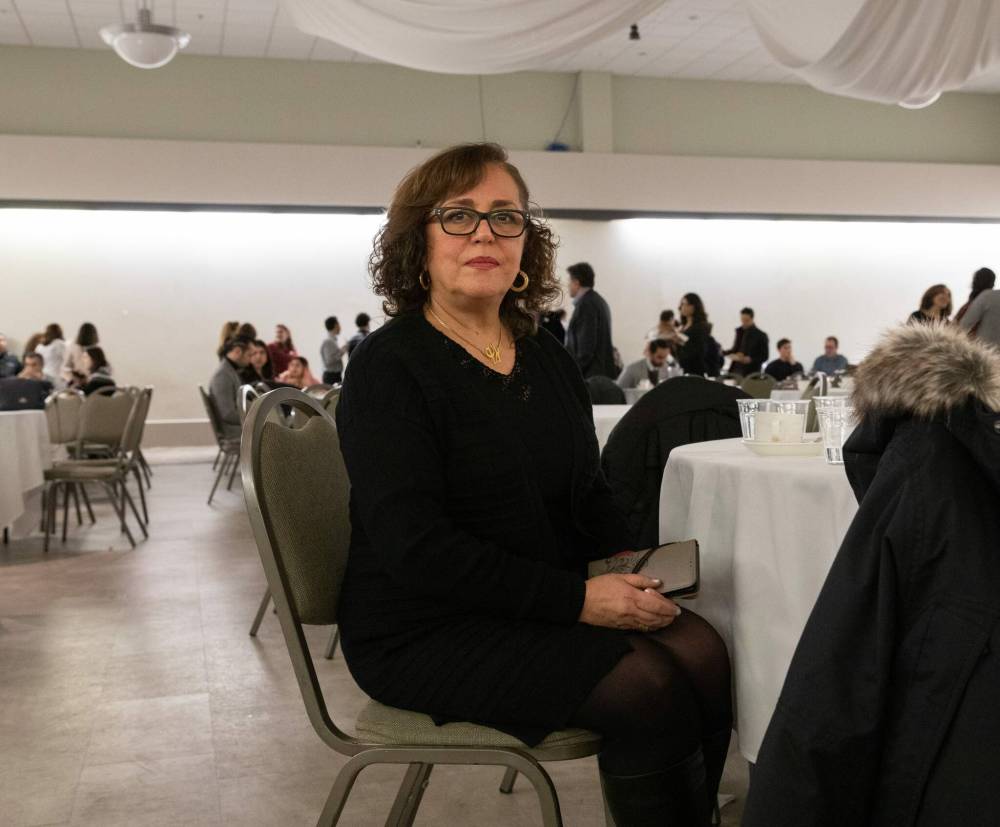
Celebrations like that, they’re important. So when Anahita Aminian and her husband came to Winnipeg 36 years ago, one of the first Iranian families to settle in the city, there was already a Yalda. Over the years it grew with the community, cherished by many, a time to savour the gifts, culture and just being together: there’s so much they’re proud of, Aminian said.
But this year, the pain weighs so heavy. In Iran, at least 495 people have been killed as a result of brutal state crackdowns on the protests that erupted after the police murder of 22-year-old Jina Mahsa Amini. Women and girls have led those protests, resisting police with their bodies, uniting in a three-word rallying cry: “woman, life, freedom.”
So the community here is “traumatized,” said Arianpour, president of the Iranian Community of Manitoba: he himself has found it hard to work, hard to sleep. In truth, some wondered whether they should hold a Yalda event at all; but it felt right to keep the tradition. It was more solemn this year than usual, but also not broken.
JESSICA LEE / WINNIPEG FREE PRESS Arian Arianpour (holding photo), president of the Iranian Community of Manitoba, says Yalda Night this year was tinged with sorrow as hundreds have been killed by Iranian authorities after protests erupted over the police murder of a 22-year-old woman. 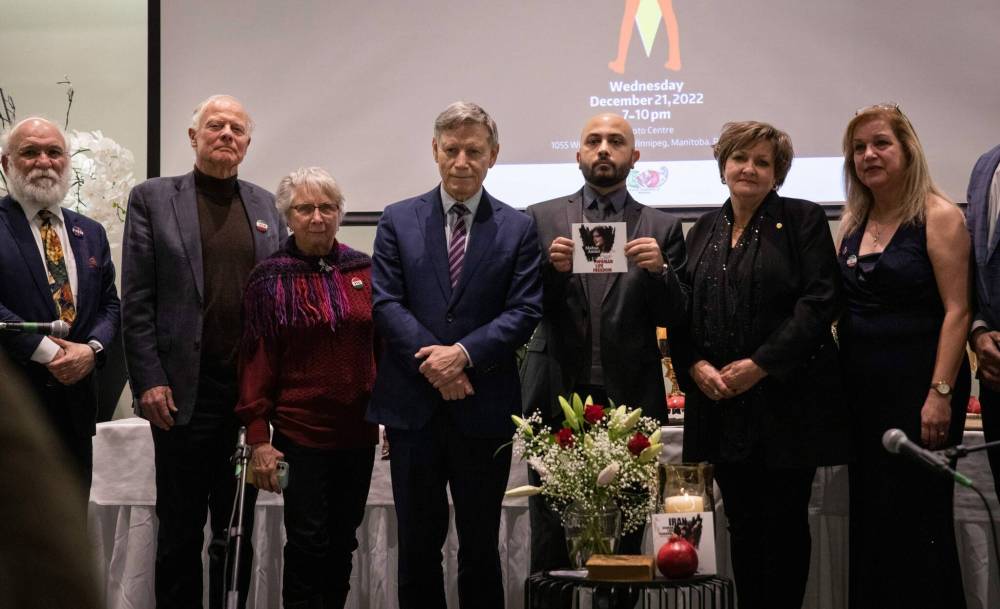
“What we’re doing here tonight, and the days after, we’re standing in solidarity with the people of Iran,” Aminian said. “It has been quite challenging, but at the same time, we’re hopeful. We can’t let go of hope. If we lose that, we lose everything. The fear is always there, especially for people who have loved ones back home… but this time it just feels different.”
What is it that feels different? Aminian paused as her eyes welled with tears, and then she started to speak.
“It’s the bravery of the women,” she said. “They put their lives in their own hands. They ran on the streets.”
Light and darkness, fear and hope: this community has been here before. It was almost exactly three years ago that they had gathered in the same Centro Caboto hall to mourn another incomprehensible loss: the 176 people killed when Iran’s military shot down a civilian plane near Tehran. Most of the victims were returning to Canada; nine were from Manitoba.
That night, Kourosh Doustshenas, a kind-spoken realtor whose fiancée, Dr. Forough Khadem, perished on the flight, walked to the podium and started talking: about her. About loss. About love. And his grief was then at its highest tide, washing over everything, including time, so today he doesn’t remember how long he spoke.
“It’s the bravery of the women… They put their lives in their own hands. They ran on the streets.”–Anahita Aminian
But he remembers the unity he felt that night and for the next 1,075 nights after. Families of the victims connected across the world; they set up an advocacy non-profit, Association of Families of Flight PS752, to fight for answers. So at the Yalda Night event, as Doustshenas once again stood up to speak at Centro Caboto, he thought back to that moment.
“We found strength in each other, we found solace in talking to each other,” he said. “And we decided, we have to fight.”
So it always goes that strength comes from being together, and the will to keep going, and to keep working for justice. Not just in Iran, but in Canada and every place where there is struggle. There are many, and sometimes their journeys are echoes of another, as the familiar patterns of power and oppression intertwine.
It was not lost on those at Winnipeg’s Yalda Night event, for instance, that on the same day, in Iran’s next-door neighbour, the Taliban suddenly banned Afghanistan’s female university students from attending courses. The ban follows more than a year in which schools for girls have been shuttered; the most extreme restrictions on women’s education in the world.
JESSICA LEE / WINNIPEG FREE PRESS Pins at the Iranian community in Winnipeg’s Yalda gathering at Centro Caboto.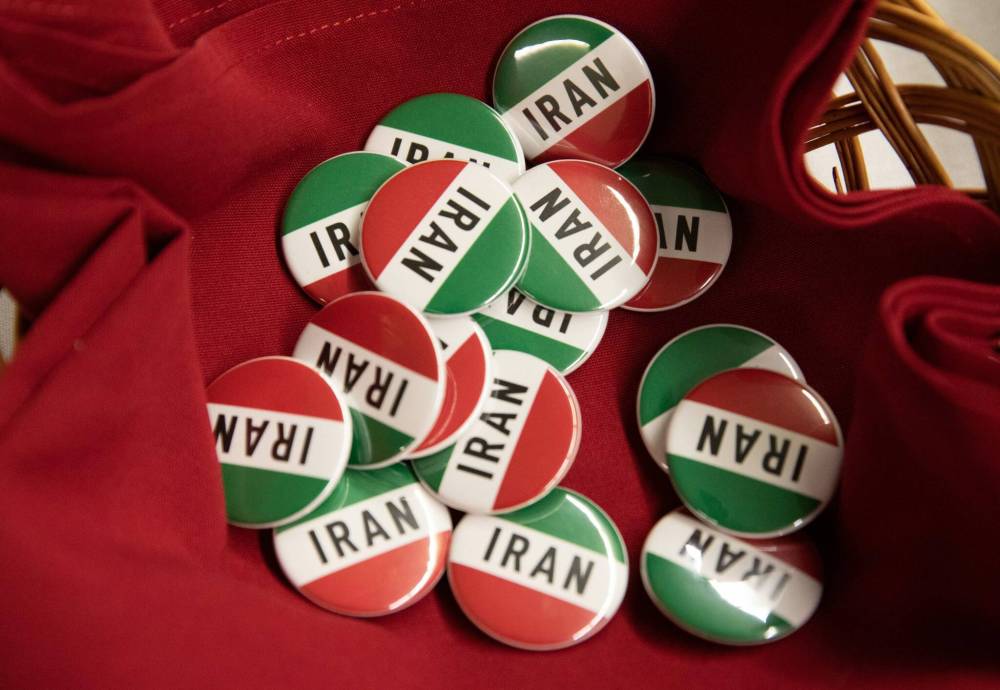
“They closed the schools, the world remained silent, they closed our universities, silence, now they’ve come for our courses,” one woman told a reporter, in the midst of a street protest. “What are we supposed to do? Kill ourselves?”
Yet in the hours after the ban, something beautiful happened: resistance. Women took to the streets in protest, and they did not go there alone. At a medical school in Nangarhar, male medical students walked out of an exam in solidarity with female counterparts. Male professors resigned in protest, and a news anchor wept on Afghan TV as he read the news.
So as we close out this year, the bravery of the women of Afghanistan, and their allies, joins the courage of Iran’s women and allies to shine a light for the world. It was a year of struggle; a year that, like all years, brought suffering to those who did not deserve it. A year of grief and hunger, war and destruction, illness and oppression. But also resistance and hope.
Photos by JESSICA LEE / WINNIPEG FREE PRESS The ancient Iranian solstice festival Yalda Night is normally a joyous affair. At this year’s local event at Centro Caboto, attendees mourned the young lives of protesters taken on the streets of Iran this year.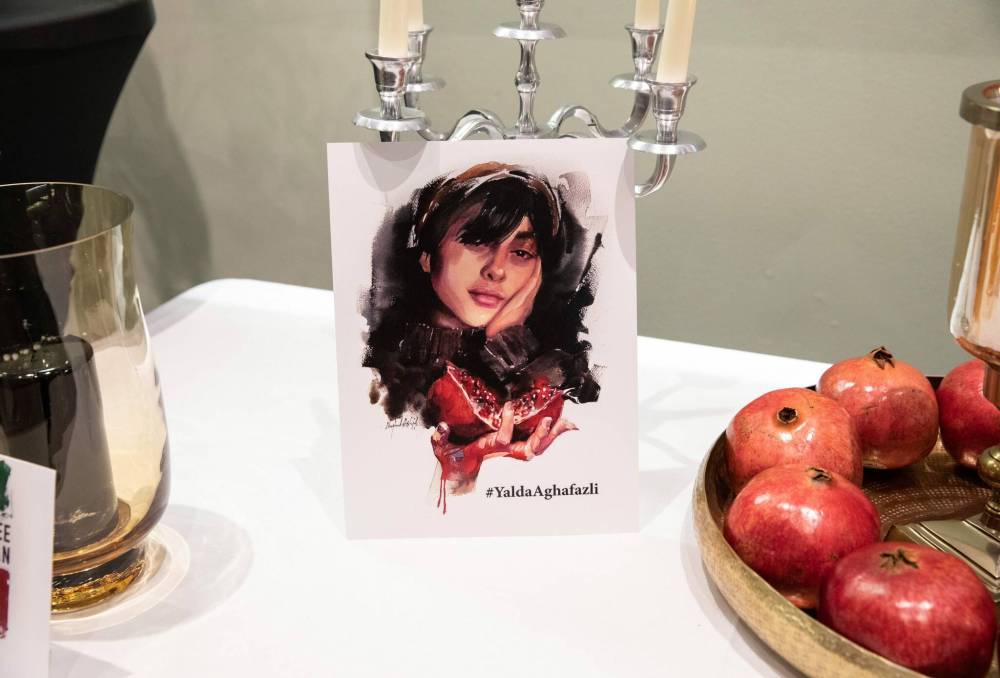
At the Yalda event, after the solemn songs and speeches were over, there was still space for joy. The community mingled over pizza, chatting pleasantly in English and Farsi; Aminian had recently welcomed her first grandchild, so a friend give her a big hug. There were smiles, and there was laughter. Memorial candles flickered on a room filled with warmth.
Outside, the longest night of the year had taken hold, smothering a shivering city with its cloak. Yet even in the grips of that night, there was still a brightness, as light from street lamps or passing cars reflected off heaved piles of snow. Winnipeg sat under the longest stretch of darkness it has seen all year, and yet it still glowed.
And I thought about something else Aminian had told me, as she reflected on the pain in her community. They had so much hope, she had mentioned, which is important. But then she said something else: a recognition of a simple truth, that hope is renewed by struggle, that even the darkest days have to be faced for brighter ones to be born.
“We have been waiting for this moment,” she said, even though it has been so painful to watch it unfold.
This weekend is a time for being together. It’s Christmas, and the last days of Hanukkah. It’s the lead-up to New Year’s Eve, when we gather hope enough to hold us through what we don’t yet know will come. But whatever the new year brings to the world, let us remember: every moment can be the one we’ve been waiting for. Because the light always returns.
melissa.martin@freepress.mb.ca
The Free Press is committed to covering faith in Manitoba. If you appreciate that coverage, help us do more! Your contribution of $10, $25 or more will allow us to deepen our reporting about faith in the province. Thanks! BECOME A FAITH JOURNALISM SUPPORTER
Our newsroom depends on a growing audience of readers to power our journalism. If you are not a paid reader, please consider becoming a subscriber.
Our newsroom depends on its audience of readers to power our journalism. Thank you for your support.
The Free Press acknowledges the financial support it receives from members of the city’s faith community, which makes our coverage of religion possible.






